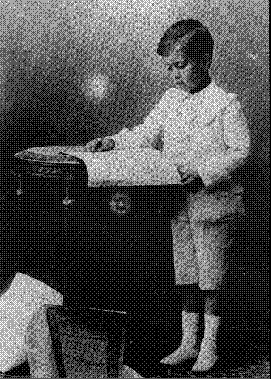
Following Arrau's Avery Fisher Hall recital in celebration of his 80th birthday (a celebration which included the surprise of Placido Domingo coming on stage wheeling a birthday cake and singing, "Happy Birthday, dear Maestro" and which will soon be released on Philips video disc), Peter G. Davis of New York magazine wrote:
"Possibly Claudio Arrau took some pleasure from the big fuss that was made over him at his eightieth birthday recital," and went on to say: "Well, Rubinstein has left us, Horowitz surfaces erratically when the spirit moves him and Serkin gives just one New York recital a season. Only Arrau continues to play steadily and with the energy of a youngster. Even at the age of 80, he has not lost sight of a performing musician's basic mission - to play great music in front of an audience in quest of the deepest musical values."
On June 3, 1986, Arrau, playing his annual recital at the Royal Festival Hall in London, received the greatest local ovation of his career following an all-Beethoven program of four fearsome sonatas which, as The London Times wrote, "would have taxed a man half his age."
Coming on the heels of the Vladimir Horowitz recital in the same hall two days before, it was as if the standing, cheering audience (made up of London's musical elite) wanted to show Arrau their special love and admiration. Earlier, The Guardian heralded, "Two octogenarian giants of the keyboard return to give recitals at the Festival Hall."
Following Arrau's recital, the Financial Times wrote: "Arrau's technique seemed to lose 30 years. It was an extraordinary performance." Before London, in equally triumphant recitals in Paris and Munich, Karl Schumann, Germany's leading music critic, wrote in the Suddeutsche Zeitung on June 2nd, 1986:
"Is it not Claudio Arrau who is the most musical and deeply serious piano phenomenon of our time?"
And in Paris, the critic who had raved the most about Horowitz, ended up kissing Arrau's hands.
His 85th birthday, on February 6, 1988, was another occasion for world celebration, winding up with a grand "Emperor" Concert in London, under the direction of Sir Colin Davis, which was televised and will be brought out on video disc together with the Beethoven Concerto No. 4, under Riccardo Muti.
Probably not since Liszt, has any one pianist possessed to the same degree as Arrau, the combined attributes of the great virtuoso (whether in Liszt, Chopin or Debussy), the profound thinker and seer in Beethoven and the passionate poet and Romantic also conscious of the dark side of Schubert, Schumann and Brahms. And all wedded to a musical honesty and integrity bordering on the fanatical.
In Mozart and Chopin, Arrau rightly observes 18th-century performance practice with appoggiaturas played on the beat. In Beethoven, although playing with the greatest expressive freedom (who else but Arrau has said that in the "metaphysical language of the late sonatas, trills become a trembling of the soul?"), he still manages to observe every textual and technical demand. And in Liszt, as Peter Davis writes in the above mentioned review, "Has any other pianist plunged into the dense complexities of this disturbing music and revealed so much substance?"
Fortunately, the Arrau 80th birthday year brought about the most lasting tribute of all - the mammoth compilation of his recordings made over a span of more than 50 years. Called by Peter Davis, "One of the century's monumental recorded legacies," it constitutes one of the largest number of records released on a single artist at one time. From Philips, the company for whom Arrau has been recording exclusively for the past 25 years, came "The Arrau Edition" - 59 records in 8 deluxe boxes comprising the complete Beethoven Sonatas and Concertos (remastered); the Brahms Concertos (remastered) and solo works; the Liszt Concertos and solo works and Schubert, Schumann and Debussy. From EMI, a 3-record historical set dating from 1929 to 1960 which contains such collectors' items as Schumann's "Carnival," "The Maiden and the Nightingale" by Granados and Schubert's Drei Klavierstucke. Another 3-record Retrospective set from CBS deals with the period from 1946 to 1952 and includes such vintage Arrau as "Kreisleriana," 4 Liszt Hungarian Rhapsodies and Ravel's Ondine and Gibet from "Gaspard de la nuit" previously unreleased.
As Peter Davis concludes in his long review: "The beauty of Arrau's playing on all these discs - and the deep centered, bronze tone that animates and luminates every thematic strand is unfailingly beautiful - does not lie only in hearing definitive statements. The real musical excitement comes from the sense of continuing adventure, the discoveries of an enquiring musical intelligence that has peered deeply, uncovered many secrets and is still looking for more. Only the greatest musicians are blessed with this capacity for constant self-renewal."
Since then Arrau's new record releases have numbered more than two dozen major works, including his third Beethoven Piano Concerto cycle with Sir Colin Davis and the Dresden Staatskapelle, the "Diabelli" Variations and many of the piano sonatas, which may lead to his second set of the complete 32. Also out on CD are his landmark recordings of the Liszt Transcendental Etudes and the Chopin complete Nocturnes, and on RCA, his monumental Bach "Goldberg" Variations, together with the Chromatic Fantasy and Fugue on a two-CD release.
####
Return to home page.